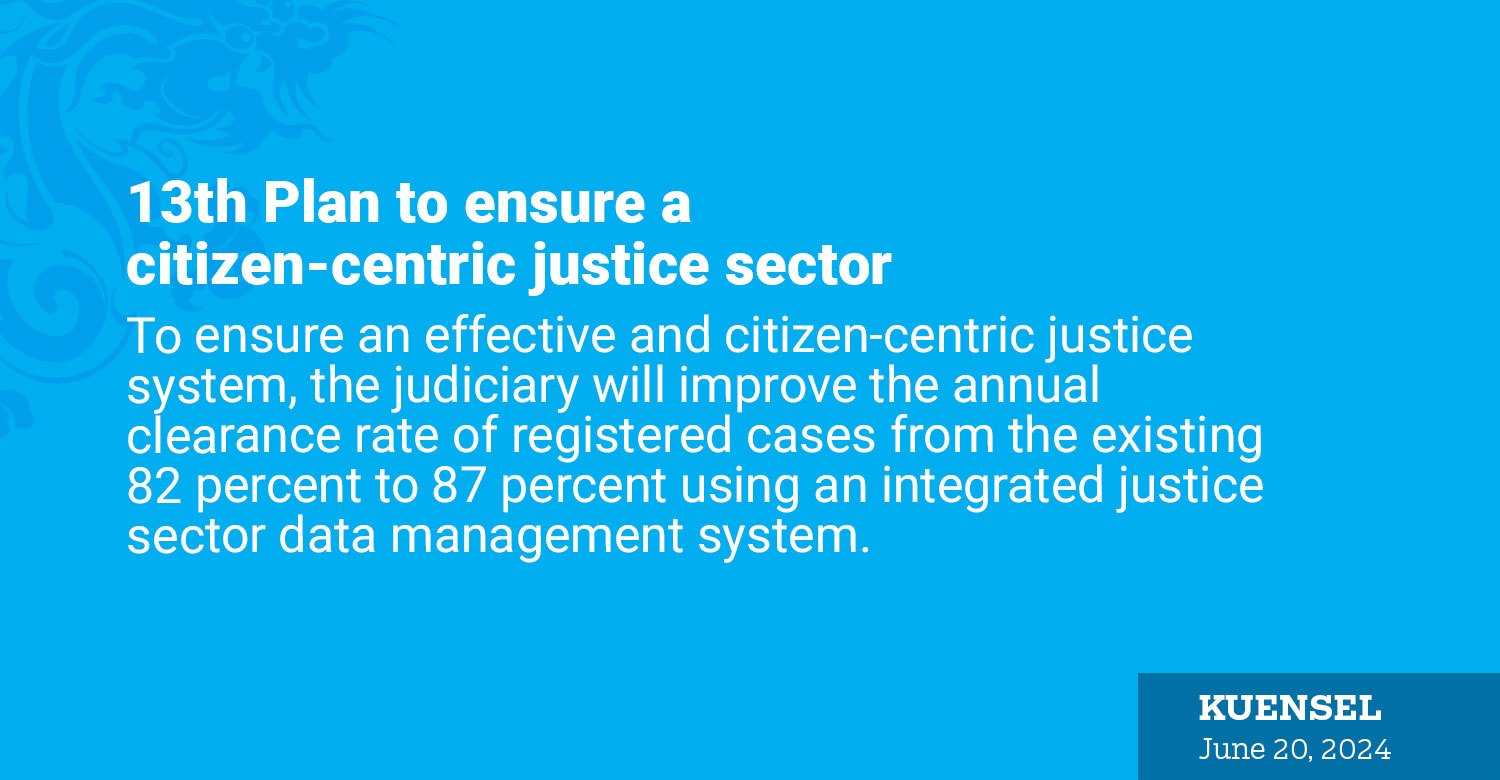
To ensure an effective and citizen-centric justice system, the judiciary will improve the annual clearance rate of registered cases from the existing 82 percent to 87 percent using an integrated justice sector data management system.
This is one of the primary goals of the justice sector in the 13th Plan to ensure an effective and citizen-centric justice system.
Last year, 9,837 new cases were registered. More than 1,700 cases were carried forward from 2022, of which 85.30 percent were addressed. Out of 1,621 pending cases, 11.04 percent were pending beyond 12 months.
The number of cases heard needs to be increased from three percent to 15 percent using an e-litigation platform. Moreover, administrative complaints related to corruption need to be reduced from 37.5 percent to five percent or less, as well as halving the 62 percent pending enforcement rate for state-prosecuted cases.
In the 13th Plan, the judiciary aims to ensure that the country’s state institutions are appropriately capacitated to uphold the rule of law. “With effective delivery of oversight roles by duty bearers, Bhutanese society will see reduced corruption and improved integrity,” the 13th Plan document said.
The Plan also seeks to enhance parliamentarians and oversight bodies. The Parliament, in coordination with the Office of the Attorney General (OAG) and other regulatory institutions, will amend and harmonise inconsistent acts.
Corruption is one area that the 13th Plan intends to address by reducing corruption risks in major sectors such as forestry, agriculture and livestock, healthcare, elections, public procurement, and financial services, among others.
An integrated justice sector data management system will be instituted. The Royal Judicial Service Council will initiate procedural reforms to simplify case proceedings.
Proper rules and guidelines will be adopted to supplement the Civil and Criminal Procedure Code (CCPC) and the Evidence Act 2005, to ensure uniform and consistent application of procedural laws and service delivery.
A whole-of-systems approach will be adopted to prevent corruption. The Anti-Corruption Commission (ACC) will lead innovative research and technology-driven corruption prevention measures in key public and private sectors.
Moreover, the 13th Plan calls for improving the ACC’s performance score from ‘medium’ to ‘high’ on all indicators, along with increased proactive research and intelligence-based investigations.
The Corruption Perception Index 2023 report recommends enhancing access to justice by streamlining judicial processes and improving business regulatory environments. Bhutan’s current rule of law index score is 69, where 100 indicates a very high rule of law. Bhutan ranks 39th out of 150 countries in the global listings.
One of the challenges identified in dispensing timely justice services is the lack of capacity and specialised skills in dealing with increasingly complex cases.
“The absence of an effective system for enforcement has resulted in several judgments remaining unenforced, impacting public confidence in the judiciary,” the 13th Plan document stated. “Procedural irregularities and inconsistencies are often the result of ambiguity in the CCPC.”
The provision of legal aid to indigent persons has yet to be fully realised, as the Legal Aid Centre under the BNLI requires human resources and capacities to deliver services.
Meanwhile, integration of data systems within the justice sector is viewed as crucial for efficient delivery of justice services, but the absence of such a system has hindered information sharing and caused delays for prosecutors and investigators in the timely follow-up of cases.
The National Assembly has so far conducted only one public hearing since its inception in 2008. “Resource constraints and relatively low levels of skills and confidence among MPs impede a more systematic rollout of public hearings,” stated the plan.












